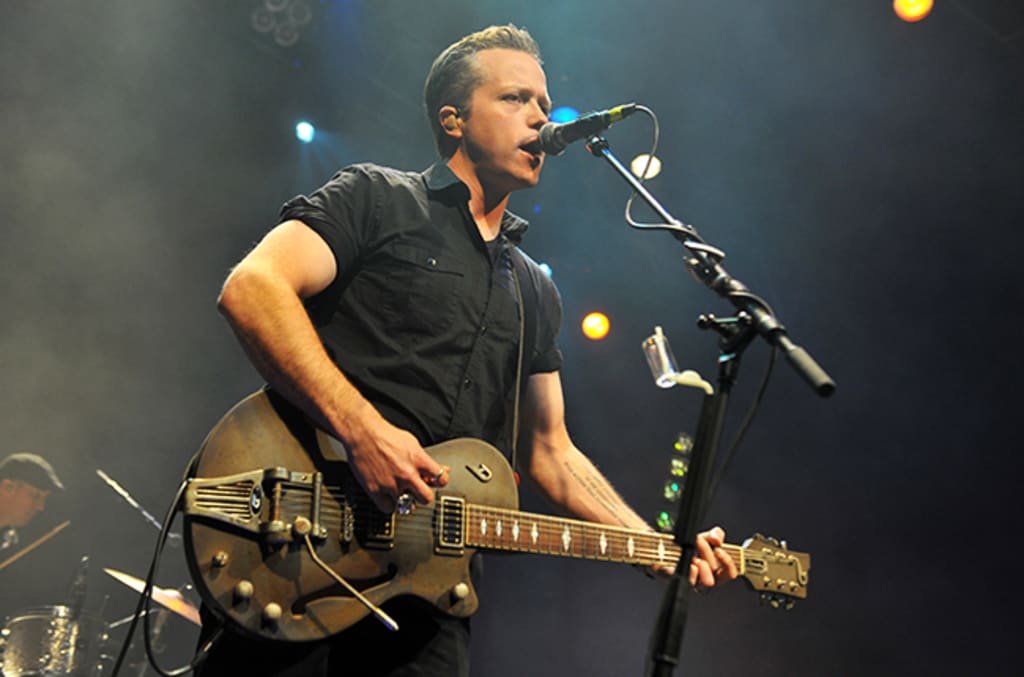Outlaw Gets Invite
Fiercely independent and outspoken rocker, Jason Isbell, garners surprise nomination for CMA album of the year.

Jason Isbell doesn’t care about the Country Music Association. He tweeted as much when pestered online back in June as to why he wasn’t appearing at CMA fest: “Sorry guys I won’t be playing any CMA fest gigs. The reason is I did not want to do that.” He cares even less for mainstream country music, going as far as saying this past July in Rolling Stone: “Most of that is just really bad music to me.” That's what made his nomination for CMA album of the year, announced September 4th, a stunner of sorts for independent artists, sending shockwaves down Music Row. Isbell has, on his own terms, become one of the most universally acclaimed songwriters of his generation. Never shy to share his thoughts, he never misses a chance to make it known he has little in common with today’s country music–other than the fact that they both call Nashville home. His album, The Nashville Sound, is one of the years most celebrated for its powerful and progressive lyrics on difficult subjects like gender inequality, mortality, race, and, of course, Trump.
The northern Alabama native, whose work often defies genre–The Nashville Sound hit number one on the indie, country, folk, and rock charts–is known for his narrative songwriting style, and his use of penetratingly precise, often literary lyrics. It would be less shocking (and is even looking more and more likely) that the indie-rocker scores an album of the year nomination at the next Grammys, rather than receiving his due from the power brokers of popular country music. Speaking of Grammys, Isbell has already taken home two in the Americana category, a genre that usually confuses most people (it’s basically narrative driven rock music) for his last album, 2015’s Something More Than Free, an impressive feat considering he releases his work through his own label, Southeastern Records, and receives virtually zero radio play.
His breakout album, Southeastern, was number one on famed NPR rock critic Ken Tucker’s 2013 end-of-the-year-list, where Tucker said: “No music moved me more, did more to make me think about life differently, than the continually revelatory album Southeastern.” You can see the problem Isbell has with the country establishment, music that, despite being popular enough to fill stadiums, is often criticized for being vapid and filled with stereotypes, music that is rife with misogyny and product placement–mostly for beer and Ford trucks, sometimes referred to as “bro-country”. Their music couldn’t be more different, and Isbell is usually quick to point that out, generally with a disarming joke.
Despite past critical successes he has still lived in relative mainstream anonymity, but The Nashville Sound has turned the thoughtful and deeply introspective southerner into an unlikely and important voice during divisive times, most notably during the bridge on “Hope the High Road”, a powerful anthem for these our current predicament, where Isbell howls through his southern drawl for folks to keep the faith, a not so subtle shot at the man who actually won less votes during the election, reminding the dejected to keep fighting towards a more equal world: “We’ll ride the ship down/ Dumping buckets overboard/ There can’t be more of them than us/ There can’t be more”. In “White Man’s World”, he writes to his two year-old daughter honestly about the corrosive legacy of racism in America, and worries what the election of a president like Trump might mean for her future, and what he’s going to tell her when she’s old enough to understand. “Cumberland Gap” is a churning, guitar-driven song about a dying coal town, his attempt to reach across the divide and make sense of all that anger–this is likely in hindsight as the song was written pre-Trump, or maybe it was an artist simply trying to understand the whole countries anxieties. But he offers no free passes and laments his country for looking in the wrong place for the “answers” to their ills.
In addition, his humorous Twitter feed and appearances on The Late Show with Stephen Colbert and The Daily Show have turned the singer-songwriter into something of a liberal cult-hero. This makes the CMA nomination all the more shocking, as Isbell is an artist who likes to continually challenge his audience and is never afraid of alienating them in the process. This is not the way Music Row has operated for decades now, and they aren’t wont to upset their advertisers, so it’s significant that they’d go with a true outsider. It will be interesting to see if Isbell elects to perform, or even attend. One has to wonder, if he somehow manages to win, will he even want the award? More importantly, if he does win and gets a chance to speak his mind on that large a platform this coming November, what will he say?





Comments
There are no comments for this story
Be the first to respond and start the conversation.